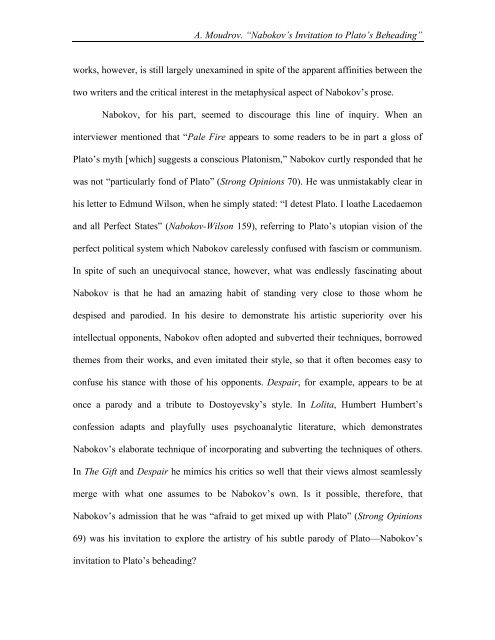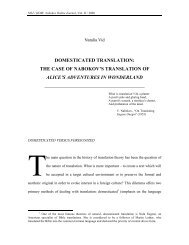Nabokov's Invitation to Plato's Beheading
Nabokov's Invitation to Plato's Beheading
Nabokov's Invitation to Plato's Beheading
- TAGS
- beheading
- etc.dal.ca
Create successful ePaper yourself
Turn your PDF publications into a flip-book with our unique Google optimized e-Paper software.
A. Moudrov. “Nabokov’s <strong>Invitation</strong> <strong>to</strong> Pla<strong>to</strong>’s <strong>Beheading</strong>”<br />
works, however, is still largely unexamined in spite of the apparent affinities between the<br />
two writers and the critical interest in the metaphysical aspect of Nabokov’s prose.<br />
Nabokov, for his part, seemed <strong>to</strong> discourage this line of inquiry. When an<br />
interviewer mentioned that “Pale Fire appears <strong>to</strong> some readers <strong>to</strong> be in part a gloss of<br />
Pla<strong>to</strong>’s myth [which] suggests a conscious Pla<strong>to</strong>nism,” Nabokov curtly responded that he<br />
was not “particularly fond of Pla<strong>to</strong>” (Strong Opinions 70). He was unmistakably clear in<br />
his letter <strong>to</strong> Edmund Wilson, when he simply stated: “I detest Pla<strong>to</strong>. I loathe Lacedaemon<br />
and all Perfect States” (Nabokov-Wilson 159), referring <strong>to</strong> Pla<strong>to</strong>’s u<strong>to</strong>pian vision of the<br />
perfect political system which Nabokov carelessly confused with fascism or communism.<br />
In spite of such an unequivocal stance, however, what was endlessly fascinating about<br />
Nabokov is that he had an amazing habit of standing very close <strong>to</strong> those whom he<br />
despised and parodied. In his desire <strong>to</strong> demonstrate his artistic superiority over his<br />
intellectual opponents, Nabokov often adopted and subverted their techniques, borrowed<br />
themes from their works, and even imitated their style, so that it often becomes easy <strong>to</strong><br />
confuse his stance with those of his opponents. Despair, for example, appears <strong>to</strong> be at<br />
once a parody and a tribute <strong>to</strong> Dos<strong>to</strong>yevsky’s style. In Lolita, Humbert Humbert’s<br />
confession adapts and playfully uses psychoanalytic literature, which demonstrates<br />
Nabokov’s elaborate technique of incorporating and subverting the techniques of others.<br />
In The Gift and Despair he mimics his critics so well that their views almost seamlessly<br />
merge with what one assumes <strong>to</strong> be Nabokov’s own. Is it possible, therefore, that<br />
Nabokov’s admission that he was “afraid <strong>to</strong> get mixed up with Pla<strong>to</strong>” (Strong Opinions<br />
69) was his invitation <strong>to</strong> explore the artistry of his subtle parody of Pla<strong>to</strong>—Nabokov’s<br />
invitation <strong>to</strong> Pla<strong>to</strong>’s beheading?
















